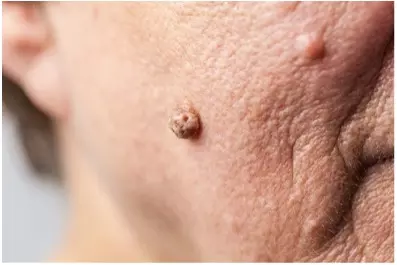BEAUTYCLINIC St. Gallen
9000 St. Gallen
BEAUTYCLINIC Zurich
8004 Zurich
BEAUTYCLINIC Winterthur
8400 Winterthur
BEAUTYCLINIC Engadin
7513 Silvaplana
BEAUTYCLINIC Chur
7000 Chur

- Body
- Face
- Skin
- Birthmark Removal
- Prices

In the case of moles, the doctor can usually assess whether they are benign or malignant on the basis of certain criteria. One look is usually enough. In the case of benign skin processes, it is sufficient to remove only these. In the case of malignant growths or spots, a safety margin of 1cm – i.e., a circle 2cm in diameter – must be removed. To ensure accuracy, we often take a small sample during removal, which is then sent to a laboratory for examination under the microscope. When the skin growth is removed by the laser, it is vaporized and nothing remains that can be examined. However, when removed by the scalpel, the excised tissue can be sent in for examination.
In summary, in certain cases it is important and sensible to send a sample to the laboratory to rule out malignancy. Depending on the findings, we always decide individually whether to remove the growth with a laser or a scalpel.

Moles can be removed with a scalpel (knife), which is the better option than laser because of the possibility of examination. However, the skin suture often results in a more or less visible scar, which sometimes looks worse than the original growth. For this reason, many patients prefer laser removal. There is no need for cutting and stitching, and the healing is usually much nicer than with scalpel removal.
During laser removal, the growth is injected with a local anesthetic and then gently removed with a CO2 laser. The tissue is vaporized. In order to achieve an optimal aesthetic result, an attempt is made to remove as little as possible. In this way, an ugly scar can be avoided. The disadvantage of this is that the growth can sometimes return – although this can also happen if the birthmark is removed with a scalpel. As it does not bleed during laser treatment, there is no need for stitches and therefore no ugly scar. The scar after laser treatment is often barely visible or not visible at all and is always much nicer than after "cutting out". Immediately after the treatment, there is a small "scab" on the skin or a crust. This falls off by itself after a few days and fresh, new skin becomes visible. Depending on the findings, we decide whether to remove a small amount of tissue before laser removal and send it for examination.
There are no significant complications with this method. Infections are very, very rare. As the laser heat does not cause bleeding, there is no need for skin stitches. However, every skin has its own way of healing. Darker skin types (FP IV-VI) tend to have more visible scars and sometimes also keloids, which are often very difficult to remove. For all other skin types, the aesthetic results are usually very satisfactory, although it can never be guaranteed what a scar will look like.
The main problem is the recurrence of the birthmark. Should this happen, the mole can be removed again by laser. Raised moles can be removed as often as required. In the case of pigmented moles that are embedded in the skin, careful consideration must be given to whether it is better to remove them with a scalpel or with a laser so as not to miss any malignant growth.
If a mole that has been lasered recurs, laboratory doctors may sometimes find cells under the microscope that look very similar to those of malignant moles. As a consequence, the recurring x should be removed together with a safety margin. This "defect" must then be covered according to plastic surgery guidelines.
Recurrence is not covered under warranty. Follow-up consultations, if desired and necessary, are included free of charge. Please note that the laboratory analysis is at your own expense and must be paid directly to the lab. You can submit these costs to your health insurance.
| Mole / Birthmark removal | CHF 250.00 |
|---|---|
| for each additional mole | CHF 50.00 |
We understand that aesthetic treatment needs to be carefully considered. We are therefore happy to take the time to answer all your questions during a free, no-obligation initial consultation. Arrange your consultation appointment today at one of our BEAUTYCLINICs.
If you would like a brief online preliminary clarification before your consultation, you can also contact us by e-mail.
No matter which way you want to reach us - we look forward to hearing/reading from you!